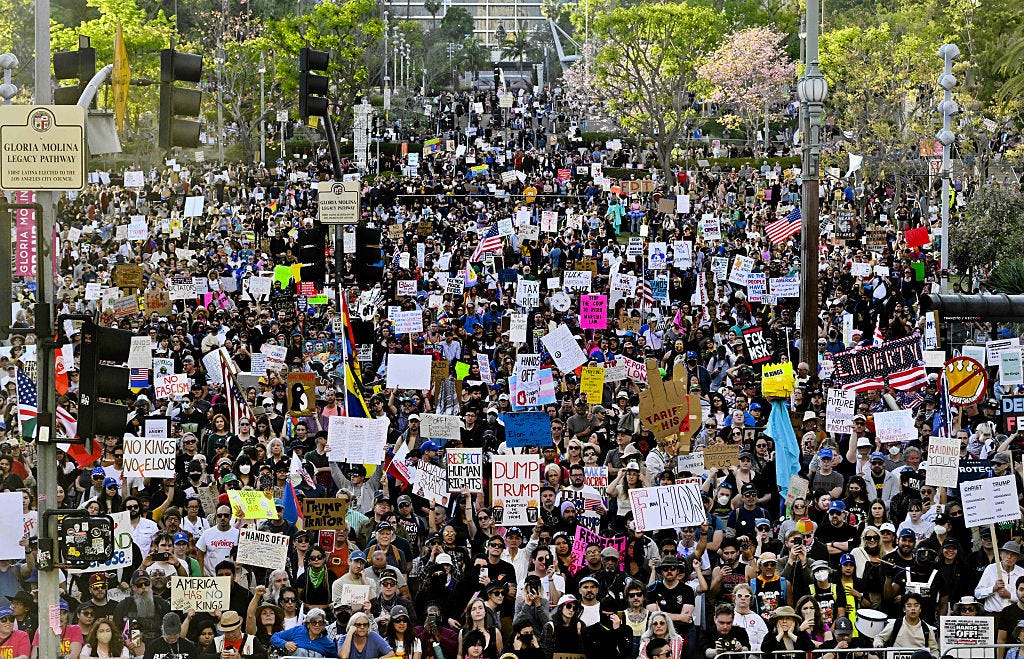'Not Very Compelling': How NPR Dismissed the Largest Protests of 2025
Earlier this month, hundreds of thousands of people (if not more) took to the streets across America as part of the “Hands Off!” protests. If you didn’t hear much about it, you’re not alone. Major news outlets, including NPR, decided that one of the largest nationwide protests since Trump took office in January wasn’t worth significant coverage.
NPR Public Editor Kelly McBride defended this editorial decision in her April 10 newsletter, titled “How does NPR cover peaceful protests when the only news is the protest?,” writing that “aside from crowd sizes, most protests aren’t newsworthy enough to warrant continuous, national coverage.” She even went to New York to watch one of the demonstrations herself, concluding, “As a news event, it wasn’t very compelling.”
Not compelling? Really?
According to reports, the “Hands Off!” movement organized more than 1,400 protests across all 50 states on April 5. The demonstrations were coordinated by a coalition of over 150 groups, including civil rights organizations, labor unions, LGBTQ+ advocates, veterans, and election activists. Protesters rallied against everything from mass deportations to federal department cuts to attacks on Social Security.
But McBride apparently found this massive, diverse, nationwide demonstration “wasn’t very compelling” as a news event. To her, the “most compelling part” was… the pictures.
This isn’t just frustrating — it’s a fundamental misunderstanding of what journalism should do.
When Americans feel compelled to take to the streets in mass numbers, news organizations should be asking why. They should be interviewing participants, exploring the issues that drove people to protest, and examining the policies being contested. Instead, NPR opted for a couple of radio stories and three web articles.

McBride writes: “The individual protests themselves are unlikely to become significant news events. Instead, NPR’s best service is to describe the broader implications of the protests, if and when those implications are clear and significant.”
But how can audiences understand the “broader implications” if news organizations don’t explain what people are protesting about in the first place?
This approach reflects a broader problem in how mainstream media covers political movements. When people organize and demonstrate, they’re not just creating photo opportunities — they’re expressing urgent concerns about policies that affect their lives. The decision to minimize coverage of these protests is itself a political choice that sidelines these concerns.
Imagine if civil rights demonstrations of the 1960s had been dismissed as “not very compelling news events” worthy only of photo essays. Or if anti-war protests had been reduced to mere crowd size estimates without exploration of the issues at stake. The absurdity becomes clear.
McBride’s position essentially argues that mass protests only become newsworthy when they turn violent or disruptive. She writes that “once a protest movement results in conflict or property damage, NPR journalists covering the protests will often note the exception.” This creates a perverse incentive: want coverage? Create conflict.
The purpose of journalism isn’t just to report on spectacle but to help the public understand significant social and political movements. When Americans mobilize around specific concerns — like the “Hands Off!” protesters did around Social Security cuts, mass deportations, and government layoffs — that’s inherently newsworthy.
By reducing these protests to just another predictable event that doesn’t warrant significant coverage, NPR and other outlets are failing in their fundamental mission: to help Americans understand what’s happening in their country and why.
Mass protests deserve more than a photo essay and a shrug. They deserve substantive coverage that explains the issues at stake and amplifies the voices of those affected. Otherwise, what’s the point of journalism at all?
